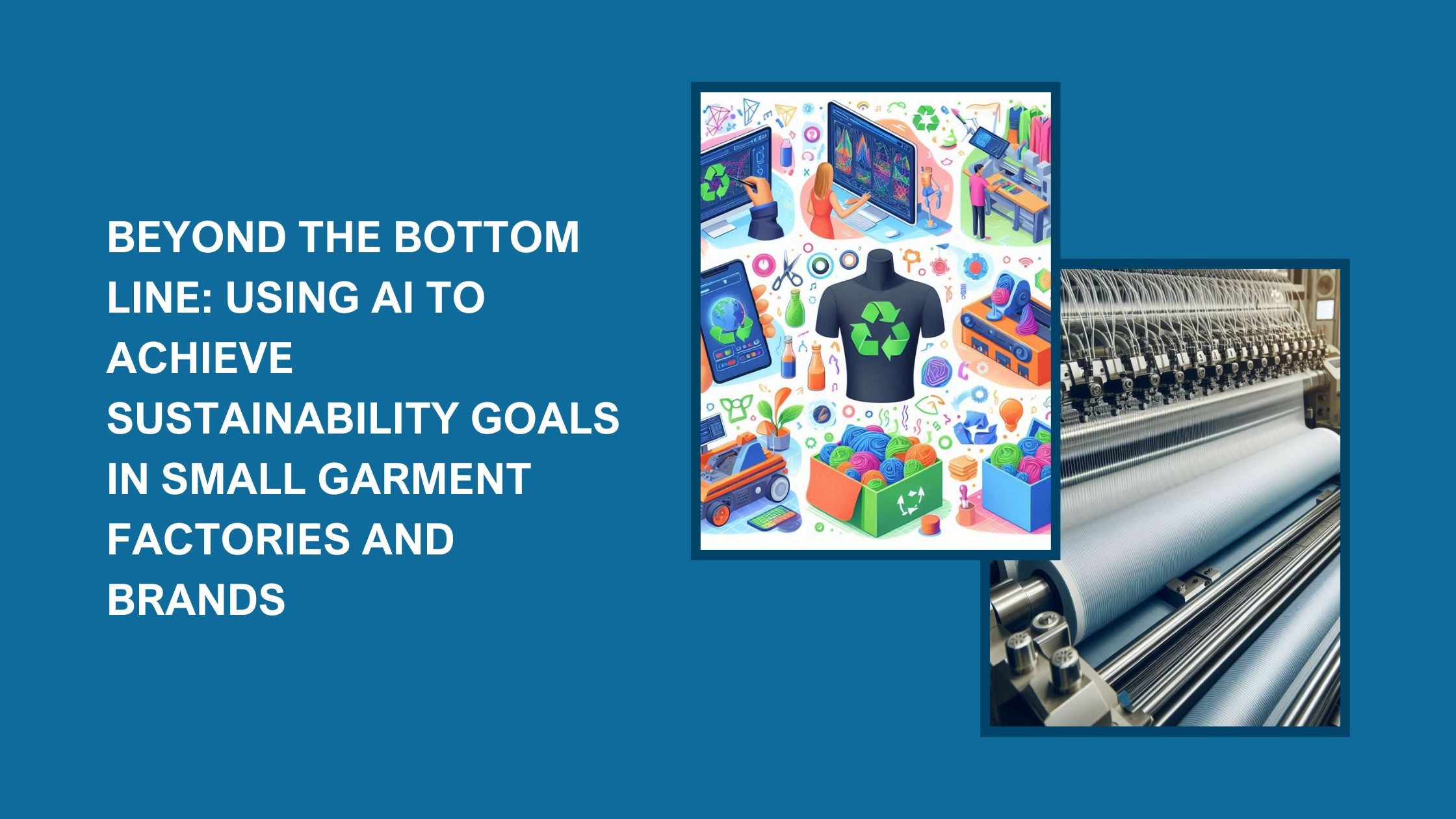Beyond the Bottom Line: Using AI to Achieve Sustainability Goals in Small Garment Factories and Brands
| Sep, 21 , 24
Are you a small garment factory owner or brand manager struggling to meet your sustainability goals? Do you feel the pressure of growing consumer demand for eco-friendly garments but aren't sure how to deliver without breaking the bank? You're not alone. The good news is that a powerful ally in the fight for sustainability might be closer than you think: Artificial Intelligence.
AI isn't just for tech giants anymore. It's becoming an increasingly accessible and transformative tool for businesses of all sizes, including small garment factories and brands. By leveraging AI, you can optimize your processes, reduce waste, and boost resource efficiency – all while moving closer to your sustainability targets and meeting consumer expectations.
Let's look at some numbers that highlight AI's potential in the garment industry:
- AI-powered production optimization can slash fabric waste by up to 20% (McKinsey & Company)
- AI-driven predictive maintenance and process improvements can boost energy efficiency by 10-15% (Deloitte)
- Intelligent supply chain optimization through AI can significantly reduce transportation emissions, lowering your overall carbon footprint (Accenture)
In this article, we'll explore how small garment factories and brands can harness the power of AI to achieve meaningful sustainability goals – without sacrificing profitability. We'll dive into practical applications, potential challenges, and the steps you can take to start your AI-driven sustainability journey today.

The Rising Importance of Sustainability in the Garment Industry
Consumer Trends and Expectations: Modern consumers prioritize eco-friendly and ethical clothing. It shifts by growing awareness of the environmental and social impacts. Consumers look for brands that offer transparency, use sustainable materials, and have ethical production practices. This trend pressurizes smaller factories and brands to adopt sustainable practices throughout their supply chains.
Challenges Faced by Small Garment Factories and Brands: Smaller players in the garment industry often face unique challenges in implementing sustainable practices. These include:
- Limited financial resources for investing in new technologies or processes
- Complex, often opaque supply chains that make tracing materials and ensuring ethical practices difficult
- Inefficient production methods that lead to excess waste and energy consumption
- Lack of expertise in sustainability practices and technologies
The Role of AI in Garment Manufacturing and Sustainability
AI is increasingly being used in the garment industry to address sustainability challenges. Some key areas include:
- Demand forecasting to reduce overproduction
- Optimizing cutting patterns to minimize fabric waste
- Improving energy efficiency in manufacturing processes
- Enhancing supply chain transparency and traceability
- Facilitating recycling and circular fashion initiatives

AI Applications for Sustainability in Garment Factories
AI for Efficient Resource Management
Optimizing Material Usage: AI-driven design software can create cutting patterns that minimize fabric waste. These systems can consider multiple garment sizes and styles, nesting them efficiently to use as much fabric as possible.
Predictive models for material ordering use historical data, current trends, and external factors to forecast demand more accurately. It helps prevent overstock situations and reduces waste from unused materials.
Reducing Energy Consumption with AI
Automation in Production Processes: AI-powered machinery can optimize energy use by adjusting operations based on real-time data. For example, sewing machines might automatically enter a low-power state when not in use.
AI systems can analyze energy consumption patterns across the factory, identifying peak usage times and inefficiencies. They can use the data to schedule production, level out energy demand, and reduce overall consumption.
Minimizing Water Waste
AI in Dyeing and Finishing Processes: Machine learning algorithms can optimize dye recipes and application processes, reducing the amount of water needed while maintaining color quality. These systems can learn from each dyeing cycle, continuously improving their efficiency.
AI can also monitor and control water recycling systems, ensuring optimal performance and identifying when maintenance is needed to prevent wastage.

AI-Powered Supply Chain Optimization for Sustainability
Predictive Analytics for Demand Forecasting
Avoiding Overproduction and Overstock: AI can analyze vast amounts of data from various sources (sales history, social media trends, weather patterns, etc.) to predict more accurately. It helps brands produce closer to actual demand, reducing unsold inventory that often ends up in landfills.
Sustainable Sourcing and Transparency
AI for Ethical Supply Chain Management: AI tools can help verify the authenticity of suppliers' sustainability claims. For example, image recognition AI can analyze satellite imagery to confirm that cotton is grown sustainably.
Blockchain AI can create a transparent, tamper-proof record of a garment's journey from raw material to finished product. It allows brands to verify and communicate the sustainability of their supply chain to consumers.
AI in Recycling and Circular Fashion Initiatives
AI for Material Sorting and Recycling: Computer vision systems can quickly and accurately sort textiles by material type and color, making recycling more efficient. This technology can handle much larger volumes than manual sorting.
Machine learning can analyze garment designs and suggest modifications that make them easier to recycle at the end of their life cycle.
Supporting Circular Fashion Models: AI can help manage complex logistics for circular fashion models, such as rental or resale platforms. It can predict when items need maintenance, optimize cleaning processes, and manage inventory across multiple use cycles.

Cost Savings and Operational Efficiency from AI
Financial Benefits of Sustainable AI Solutions: While implementing AI solutions requires significant upfront investment, the long-term benefits can be substantial:
- Reduced material costs due to less waste
- Lower energy bills from improved efficiency
- Decreased labor costs through automation of repetitive tasks
- Improved inventory management leads to less tied-up capital
- Potential for premium pricing due to improved sustainability credentials
Challenges in Implementing AI for Sustainability
Initial Investment Costs: Small garment factories and brands often struggle with the high upfront costs of AI implementation. It includes the technology, the costs of integrating it into existing systems, potentially upgrading other infrastructure, and training staff.
AI Skills Gap: There's often a significant skills gap using AI in the garment industry. Existing staff may need extensive training to work effectively with new AI systems. Alternatively, factories may need to hire new, specialized staff, which can be expensive and challenging, especially in regions of scarce skills.
To address these challenges, small factories and brands might consider starting with smaller, focused AI projects to prove the concept before scaling up. They could also explore partnerships with tech companies or prominent brands to share costs and expertise. Government initiatives or industry associations might also support or fund sustainability-focused AI projects.

Embracing AI for Sustainability: Your Next Steps
As we've explored, AI offers tremendous potential for small garment factories and brands to achieve sustainability goals. While the journey may seem daunting, the long-term benefits for your business, customers, and the planet are immeasurable.
Ready to take your first steps towards AI-driven sustainability? EverLighten is here to help you navigate this exciting transition. We support small to medium-sized garment businesses with cutting-edge, sustainable practices.
Why Choose EverLighten?
- 100% Customization: We tailor our garment solutions to fit your unique needs and goals.
- 100% Quality Check: Our rigorous quality assurance ensures high-quality garments.
- Free Design Help: Get expert assistance in designing your garments.
- Worldwide Delivery: We can support your journey no matter where you are.
- 24/7 Support: Our team will address your questions and concerns.
- Unlimited Revisions: We work with you until you're 100% content with your garments.
- Low MOQ: Start small and scale up as you see results - no massive initial investment required.
Take the first step towards a more sustainable, efficient, and profitable future for your garment business. Contact EverLighten today to learn how we can help you harness the power of AI for sustainable garments.
FAQs
Q: Is AI implementation suitable for small garment factories and brands?
A: Absolutely! AI solutions can fit businesses of all sizes. Many offer low MOQ options to help small garment factories without a massive upfront investment.
Q: How long does it generally take for AI initiatives to yield results?
A: While every business is different, many start seeing measurable improvements in efficiency and sustainability within 3-6 months of implementation.
Q: Do I need to hire new staff to manage AI systems?
A: Not necessarily. Many solutions are user-friendly and provide comprehensive training for your existing staff. However, some businesses bring on specialized talent as they expand their AI capabilities.
Q: Can AI impact my factory or brand's sustainability efforts?
A: Yes! As discussed in this blog, AI can substantially reduce waste, energy consumption, and resource use while optimizing your operations for sustainability.

